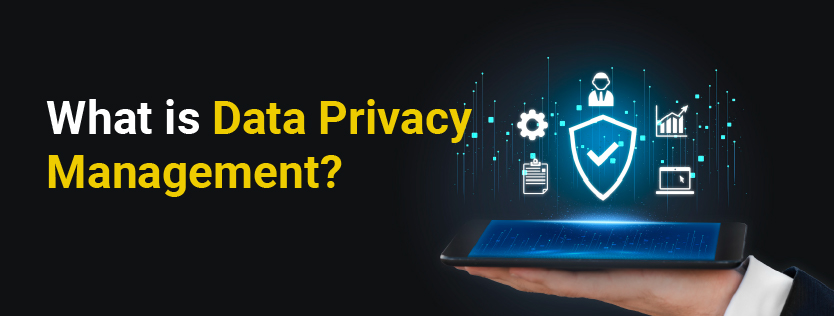What is Data Privacy Management?
Organizations that want to safeguard customer data, adhere to privacy laws, and gain the public’s trust must implement data privacy management under the CIPM framework. Professionals in CIPM make sure that organizations prioritize privacy as a primary value by implementing vital privacy programs, risk mitigation methods, and adherence to best practices. The benefits of data privacy management within CIPM include excellent data protection, compliance with laws, improved consumer trust, and a competitive edge in the market. Organizations can provide a solid basis for privacy protection by hiring CIPM specialists and implementing efficient data privacy management procedures.

What is Data Privacy Management?
Data privacy management is the systematic technique organizations use to ensure the protection, management, and ethical handling of the personal data of individuals. Implement policies, procedures, and technology to safeguard sensitive data, preventing unauthorized access, use, or disclosure. Maintaining compliance with relevant privacy laws, regulations, and industry best practices is the primary goal of data privacy management, in addition to upholding the rights of individuals to privacy.
Core Principles of Data Privacy Management
1. Privacy Governance: CIPM professionals establish privacy governance frameworks, policies, and procedures that outline the organization’s commitment to protecting personal data. They ensure privacy measures align with the organization’s overall goals, compliance requirements, and industry standards.
2. Privacy by Design and Default: CIPM professionals promote privacy by design principles to ensure privacy is included in creating goods, services, and systems. They encourage the concept of privacy as the default setting, minimizing the collection and use of personal data to what is necessary and with individual’s consent.
3. Risk Assessment and Mitigation: CIPM professionals conduct comprehensive privacy risk assessments to identify and evaluate potential vulnerabilities within data processing activities. They develop strategies to mitigate risks, implement appropriate controls, and respond effectively to privacy incidents.
4. Data Subject Rights: CIPM experts assist people in exercising their privacy rights, such as the right to view, correct, and erase personal data. They create procedures and systems to respond to data subject requests promptly and efficiently while upholding legal standards.
Role of CIPM Professionals in Data Privacy Management
1. Design and Implement Privacy Programs: CIPM professionals design and set up privacy programs tailored to the organization’s requirements. They develop guidelines for policies, procedures, and controls that comply with privacy laws and industry standards.
2. Privacy Audits and Assessments: CIPM professionals perform regular audits and assessments to evaluate the effectiveness of privacy programs, identify gaps or vulnerabilities, and recommend improvements. They ensure that privacy practices align with organizational objectives and evolving regulatory requirements.
3. Privacy Impact Assessments: CIPM experts conduct a privacy impact analysis to identify potential privacy concerns and ensure appropriate measures are implemented to mitigate them. These evaluations aid organizations in making defensible choices regarding data processing operations.
4. Data Breach Management: CIPM professionals play a critical role in incident response in a data breach. They lead investigations, assess the impact, coordinate breach notification processes, and implement corrective actions to prevent future breaches.
Benefits of Data Privacy Management
1. Enhanced Data Protection: Data privacy management in CIPM ensures that personal information is handled carefully. Implementing proactive measures and adhering to stringent security protocols minimizes the risk of data breaches, identity theft, and unauthorized access. Robust privacy practices safeguard sensitive data and protect individual’s privacy rights.
2. Competitive Advantage: Organizations that prioritize data privacy management gain a competitive edge. They demonstrate their commitment to privacy protection, attracting privacy-conscious customers and partners who value organizations that respect individual’s privacy rights.
3. Improved Customer Trust: Individuals feel more confident that their personal information is treated appropriately with adequate data privacy management. As a result, trust is fostered, client loyalty is increased, and the company’s brand reputation is strengthened.
4. Compliance and Risk Mitigation: Organizations can reduce non-compliance, financial and legal risks by following privacy laws and best practices. CIPM professionals assist in navigating complex privacy landscapes, ensuring adherence to applicable laws and regulations.
About InfosecTrain
InfosecTrain is a worldwide technology and security training and consulting company focusing on various IT security programs and services. Our CIPM courses are made to assist you in understanding privacy program applications, managing your organization’s privacy, and explaining them. The CIPM certificate demonstrates your proficiency in privacy program management and your ability to design, implement, and oversee a privacy program at every point of its lifecycle. It would help if you mastered each of the concepts and topics outlined in the CIPM body of knowledge to be certified.
TRAINING CALENDAR of Upcoming Batches For CIPM
| Start Date | End Date | Start - End Time | Batch Type | Training Mode | Batch Status | |
|---|---|---|---|---|---|---|
| 05-Jul-2025 | 20-Jul-2025 | 19:00 - 23:00 IST | Weekend | Online | [ Open ] |


 1800-843-7890 (India)
1800-843-7890 (India)